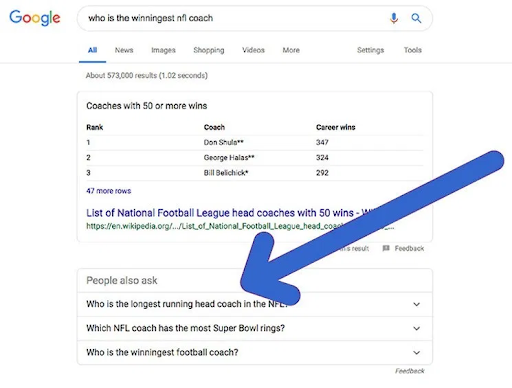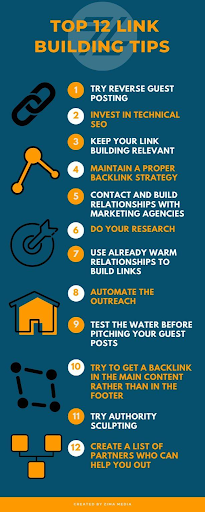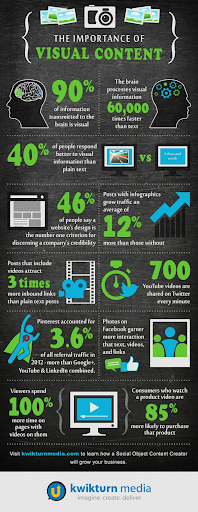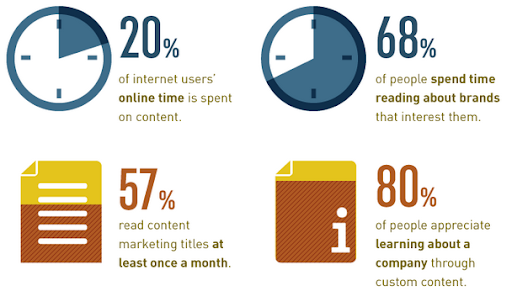Expert Tips on How to Create Content that Ranks
Expert-Tips-on-How-to-Create-Content-that-Ranks
What does Google rank?
The most significant challenge that content marketers face is understanding the working of Google’s algorithm and determining the factors that can get their content ranked high on Google.
The first factor that you should focus on, however, is not to create content just for the bots, but for your readers. Human-centered content that’s informative, interesting, and captivates readers’ attention is more likely to get ranked by Google as compared to articles that’re stuffed with keywords.
For this, you need to identify your ideal customer and know your target audience before diving into the process of creating content that appeals to them.
Further, develop a content strategy that’s simple yet effective and start publishing content on various channels, including social media platforms and your organization’s blog.
Remember, if you want your prospective customers to become buyers, you need to prove why your products are worth it, and for that, you need to prove why you’re worth listening to.
So, assuming that you already know you audience and have a content strategy in place, we’ve listed down some clear actionable directions on how to create content that’s of interest to your prospects and ranks on Google.

Planning it, Writing it, Getting it Ranked
If your content isn’t getting ranked on the first page of Google’s search results, you’re just creating noise that none of your customers are listening to.
Effective content marketing is about generating content that develops your readers’ interest by focusing on their needs, provides efficient solutions to their problems, and is UNIQUE.
Almost every single business nowadays is actively participating in the online content world, but only 9.37% of this content actually gets ranked on Google, the rest 90.63% receives no traffic!
The expert SEO content writing tips below can guide you on how to create content that engages your audience, ranks well on giant search engines, and gets you the organic traffic that you dream of.
1. Focus on Your Audience’s Needs and Questions
If you want your content to attract the right audience, make it relevant. In a sense, create content that answers the questions and queries of your customers, addresses their issues, and provides solutions.
This type of content cannot be generated unless you know your audience. For this, any expert content marketer would recommend using Google Analytics to collect user behavior data.
By using this free tool, you can see where your web traffic is coming from and then generate the right content to attract more visitors.
Generating relevant content can make you content marketing strategy more effective by allowing you to target the right audience by providing them with what they’re looking for.
You can also monitor your bounce rate with Google Analytics and work to reduce it by improving and optimizing your content.
2. Understand Your Customers’ Search Intent
By now, we have established the fact that Google is focused on providing great user experience. So, the search giant ranks pages that cater to customer needs, which is the major reason why your content marketing efforts should be human-centered.
Understanding your users search intent when you’re targeting a specific keyword can help you generate content that’s more useful. For instance, if the user is searching for effective local SEO, they’re mostly likely trying to find ways on how to optimize their site for local SEO. In such a case, expect a post with local SEO tips to rank well.
Another way to rank high on Google is by posting engaging forms of content such as videos and infographics. This can make the visitors stay on your page for long, so Google assumes your content is useful.
You can link to relevant posts on your other webpages as well to keep the users on your site.
The goal here is to understand what you customer wants and generate content that can keep them on your site for long. This would lead to reduced bounce rate and a higher chance of your posts getting ranked on Google.
3. Target Less Competitive Topics
If you own a small business or are a startup, it may be hard for you to rank against large organizations.
For small or medium sized businesses, the key to ranking high is focusing on less competitive topics. Skip the broad topics and start publishing content on long-tail problems. For instance, for someone who sells rugs, a post on ‘how to stop your rug from shedding’ may rank high.
In case you have a local business, posting content that targets hyper-local topics can be a great idea as well.
Remember, competition on long-tail searches is much lower and users are more likely to convert if you address their issues properly.
To find a topic, try searching for common problems related to your industry on Google, and carefully view the People Also Ask boxes as those can give you an insight into users’ intent. To better understand what users a looking for, you can also pay attention to the options that appear under Google’s search bar while you’re entering a query.

Further, create content that addresses those queries and monitor the web traffic by using Google Search Console.
4. Keyword Analysis and Research
Ranking high on Google is nearly impossible if you aren’t using the right keywords. Keeping this in view, I’d recommend you to make use of the numerous keyword research tools available online.
Ubersuggest can be great for starters and you can get complete directions on how to use it from the guides by Neil Patel. The tool provides keyword suggestions, the estimate volume, as well as CPC, PD and SD. Plus, you can get ideas for long-tail keywords that could be used for content creation.
Keyword research is one of the most important parts of content marketing as it assists your customers in finding your products and services, and skipping it means you’re losing potential customers to competition.
So, after you’ve made sure the content being generated is relevant, optimize it for SEO by using the right keywords. If the online tools seem too tricky, suggestions from a team of certified SEO experts can help get you ranked high.
5. Backlinks can Help You
Over the years, Google’s algorithm has become more complex than ever and hundreds of factors can influence your site’s ranking. If you don’t happen to have detailed and updated knowledge of Google’s numerous ranking factors, it’s best to either go with the advice of experts, or simply partner up with a digital marketing agency.
However, in any case, never ignore backlinks!
Quality backlinks can help improve your search engine rankings by increasing your domain authority and letting Google know that your content is useful.
To get backlinks, you should definitely start creating great content that’s optimized around the search terms you want it to rank for.
Analyze the type of content that other sites in your niche link to, and determine the kind of content you need to create.
Further, contact the sites where you want your content to be linked and let them know about your posts.
Here are some additional link building tips that you can follow:

6. Make Your Content Visually Appealing
Nobody likes reading plain words forming a boring wall of text. After having written a few sentences, make things interesting by breaking up the copy with an image, gif, or infographic.
It isn’t necessary for the images to be anything special. You can even add screenshots if they’re relevant.
Adding images can also be a great way of demonstrating what you’re trying to explain in the post. This can increase your content’s readability and make it easier to be understood by the reader.
Apart from images, videos can also be used for explaining and answering questions.
The point is, visuals can help your content rank high, and you can even start getting traffic from Google Images.
In case you can’t find any relevant videos or images, just break the text into subsections with headers.
The key is to make it interesting and engaging so that the reader stays on your page for long, finds your content useful, and is convinced to buy from you.
Visuals can improve visitor satisfaction, leading to a low bounce rate, increased conversions, and higher rankings.
Here are some facts why you should make use of visuals when it comes to content marketing:

7. Tease Your Audience with Hints
The power of expectation and ambiguity can make your visitors stay for longer. It means, giving your audience hints on what’s coming next can make them excited to see it.
For instance, you can show your target audience a sneak peak of an upcoming post so that they’d wait for you to publish it and would actually be interested in reading.
The key to a successful blog is to build anticipation in your audience so they’d wait for the next post.
That’s because, anticipation and expectation are two emotions that can build your readers interest and persuade them to read your blog posts instead of just skimming.
And if they’re reading it, you can convince them to take the next desired action, such as buy a product from you or hire you for a service.
It may seem quite simple, but warming up your readers for an upcoming post, event, or product lunch can put your content marketing on the path to success.
And when the readers are interested in your content, Google would be too, given that you’re using the right keywords.
8. Know How to Leverage the Power of Words
Another great way of building readers’ interest is by evoking emotional response in them through powerful words that can keep them engaged.
Readers often connect with brands that post engaging content, and if they’re spending time learning about your products and services, they’re likely to spend their money too. Have a look at these stats:

How to create content that’s engaging?
Leverage the power of words!
You can captivate your readers’ attention with compelling titles that they won’t be able to ignore. For instance, on the sites of Forbes and Buzzfeed, you’d see each article title includes a powerful word that evokes emotions and makes the post irresistible.
The fact is, human attention span now is as less as 8 seconds. With so many distractions online, you need to draw the readers with words that they can’t possibly ignore, such as:
- Favorite
- Powerful
- Magnetic
- Cripple
- Crazy
- Sure-fire
- Smart
Would powerful titles boost conversions?
Yes! Because once you’ve made the readers listen to you, there’s a huge possibility they’d follow your call-to-action.
Plus, powerful headlines often rank high on Google and drive the most organic traffic.
Do remember that organic search can take a few weeks, even months to grow on new websites, so don’t give up and keep putting in your best efforts.
If handling it all on your own seems tiresome, hire a professional content marketer, or partner up with a digital marketing agency with an in-house team of SEO experts and experienced content writers who know how to grab audience attention.
By - 11 Aug 2020
Most Viewed Articles
-

By - 16 Mar 2020
9 Key Elements of an Effective Social Media Marketing Strategy -

By - 27 Mar 2020
5 Major Factors that can Impact Your Local SEO in 2020 -

By - 28 Sep 2020
8 Essential SEO Copywriting Rules You Need to Follow -

By - 29 Jan 2021
Digital Media Marketing Agencies: 7 Predictions for 2021 -

By - 01 Oct 2021
6 Rank Tracker Tools to Check Google Rankings
